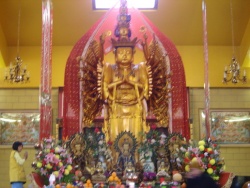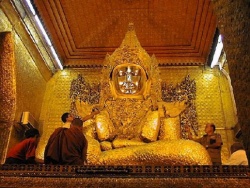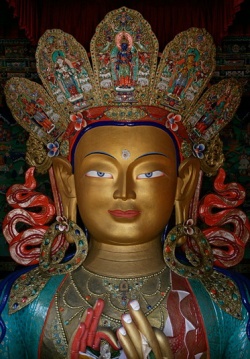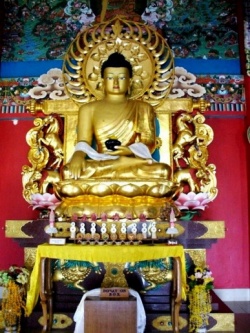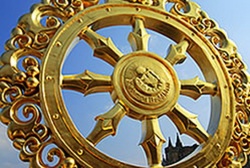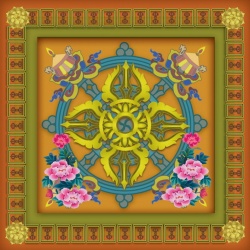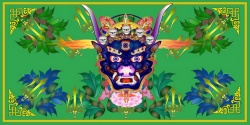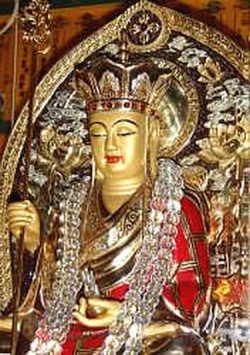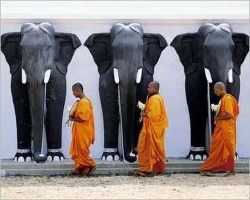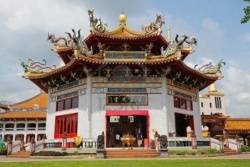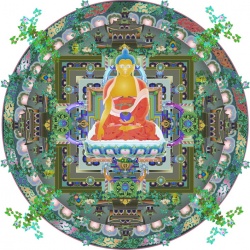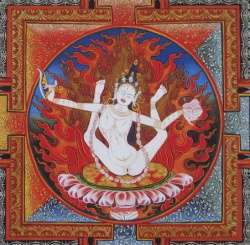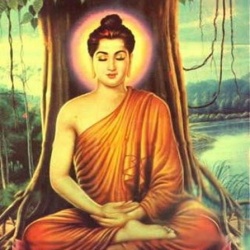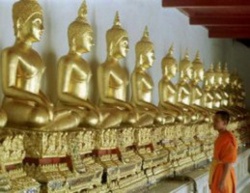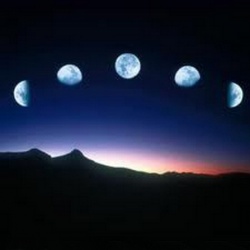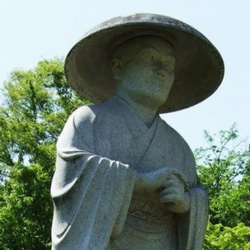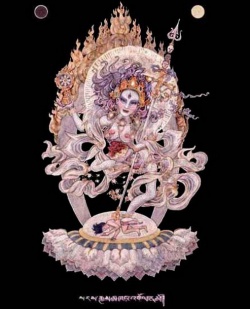Difference between revisions of "Namo Fundamental Teacher Shakyamuni Buddha"
m (VTao moved page NSutra on Impermanence to Namo Fundamental Teacher Shakyamuni Buddha over redirect) |
|||
| Line 207: | Line 207: | ||
[[Jetavana Grove]] in [[Anathapindika]] Park. The place donated by {{Wiki|Prince}} [[Jetavana]] and elderly [[Anathapindika]]. It is one of the most famous [[monastery]] where the [[Buddha]] delivered many important sermons such as the [[Diamond Sutra]] and this [[sutra]]. [[bhiksus]] (in [[Sanskrit]]). In [[Buddhism]], [[ordained]] [[monks]] who leave behind the {{Wiki|secular}} [[life]], devote themselves to the practice of [[Buddhism]], and observe the [[Bhiksu]] [[percepts]] defining the conduct of a [[monk]]. [[Tathagata]]. One of the ten titles of a [[buddha]]. “[[One who has thus come]], [[one who has thus gone]]”; the term [[Shakyamuni Buddha]] often used to refer to himself, denoting the [[empty]] [[nature]] of “[[self]]”, and that a [[buddha]] is one with the [[Truth]] (“[[suchness]]”). the [[Worthy]] and Completely [[Enlightened One]]. Two of the ten titles of a [[buddha]]: One who is [[worthy]] of [[respect]] ([[arhat]]) and one who is rightly [[enlightened]] and [[knows]] the whole [[truth]] ([[Samyak-sambuddha]]). | [[Jetavana Grove]] in [[Anathapindika]] Park. The place donated by {{Wiki|Prince}} [[Jetavana]] and elderly [[Anathapindika]]. It is one of the most famous [[monastery]] where the [[Buddha]] delivered many important sermons such as the [[Diamond Sutra]] and this [[sutra]]. [[bhiksus]] (in [[Sanskrit]]). In [[Buddhism]], [[ordained]] [[monks]] who leave behind the {{Wiki|secular}} [[life]], devote themselves to the practice of [[Buddhism]], and observe the [[Bhiksu]] [[percepts]] defining the conduct of a [[monk]]. [[Tathagata]]. One of the ten titles of a [[buddha]]. “[[One who has thus come]], [[one who has thus gone]]”; the term [[Shakyamuni Buddha]] often used to refer to himself, denoting the [[empty]] [[nature]] of “[[self]]”, and that a [[buddha]] is one with the [[Truth]] (“[[suchness]]”). the [[Worthy]] and Completely [[Enlightened One]]. Two of the ten titles of a [[buddha]]: One who is [[worthy]] of [[respect]] ([[arhat]]) and one who is rightly [[enlightened]] and [[knows]] the whole [[truth]] ([[Samyak-sambuddha]]). | ||
| − | [[gatha]]. A [[Sanskrit]] term for a [[religious]] | + | [[gatha]]. A [[Sanskrit]] term for a [[religious]] verse or [[stanza]]. [[World Honored One]] ([[Bhagavan]] in [[Sanskrit]]). One of the ten titles of a [[buddha]]. The [[Buddha]] is [[awakened]] to the [[truth]] and is determined to liberate all [[sentient beings]] through his teachings. Because of his [[great compassion]] and [[wisdom]], the [[Buddha]] is honored by all [[sentient beings]] in the [[world]]. |
[[devas]], [[dragons]], [[yaksas]], [[ghandaras]] and [[asuras]]. These five plus [[garudas]], [[kimnaras]] and [[mahoragas]] are the eight kinds of [[gods]] and various {{Wiki|non-human}} [[beings]] that are regarded as [[protectors]] of the [[Buddhist Dharma]] and often appear as part of the audience at the [[Buddha’s]] sermons. | [[devas]], [[dragons]], [[yaksas]], [[ghandaras]] and [[asuras]]. These five plus [[garudas]], [[kimnaras]] and [[mahoragas]] are the eight kinds of [[gods]] and various {{Wiki|non-human}} [[beings]] that are regarded as [[protectors]] of the [[Buddhist Dharma]] and often appear as part of the audience at the [[Buddha’s]] sermons. | ||
The [[Sutra on Impermanence]] Annotations | The [[Sutra on Impermanence]] Annotations | ||
Revision as of 06:52, 26 January 2014
Sutra on Impermanence
Translated from the Chinese and annotated by the Chung Tai Translation Committee August 2008 v1.06.2
Namo Fundamental Teacher Shakyamuni Buddha
SUTRA OPENING GATHA
The Dharma, infinitely profound and subtle, Is rarely encountered even in a million kalpas. Now we are able to hear, study, and follow it, May we fully realize the Tathagata’s true meaning.
The Sutra on Impermanence
THE SUTRA ON IMPERMANENCE
I prostrate and take refuge in the Unsurpassed One Who, with endless vows of great compassion, Ferries sentient beings across the stream of birth and death, To reach the safe haven of nirvana. With great charity, morality, tolerance, and diligence, One-mind, expedience, right wisdom, and power, Having reached perfection in benefiting self and others, He is called the Tamer, Teacher of Heavenly and Human Beings.
I prostrate and take refuge in the wondrous Dharma treasury; By the teaching of three “Fours” and two “Fives” being perfect and clear,
And the “Seven” and “Eight” opening the gate to the Four Truths,
Cultivators reach the shore of the Unconditioned. The Dharma clouds and Dharma rain imbue all beings, Eliminating searing afflictions and illnesses, Tempering and converting the obstinate, Guiding everyone appropriately, not by force. I prostrate and take refuge in the saints, The superior beings of the eight stages, Who can be freed from defilements. With the vajra scepter of wisdom, They shatter the mountain of delusion, Forever severing the beginningless ties and fetters. The Sutra on Impermanence
In the epoch from Deer Park to the Twin Trees, They follow the Buddha in propagating the True Teaching. According to individual vows and karma, they complete Their missions, realize nonbirth, and abide in stillness With body and knowledge extinguished. I prostrate and venerate the Three Jewels, The true source of liberation for all, Leading those drowning in samsara From foolish delusion to enlightenment. All who are born will die,
All beauty will fade,
The strong are stricken by illness, And no one can escape.
Even the great Mt. Sumeru
Will erode by the kalpa’s end.
The vast and fathomless seas
Will eventually dry up.
The earth, sun, and moon
Will all perish in due time.
Not one thing in the world
Can escape impermanence.
From beings in the Neither Thought nor Non-Thought Heaven,
Down to the Wheel-Turning Kings Accompanied by the seven treasures and Surrounded by a thousand sons,
When their lives have ended,
Without a moment’s delay,
They drift again in the sea of death, And suffer according to their karma. The Sutra on Impermanence
Transmigrating within the Triple Realm Is like the turning of a well-bucket’s wheel, Or like a silkworm,
Spinning a cocoon to confine itself. Even the unsurpassed buddhas,
Pratyekabuddhas, and shravakas, Give up their impermanent bodies, Why not ordinary beings!
Parents, spouses, and children, Siblings and other relatives,
Witnessing the separation of life and death, Don’t they all lament and grieve? Therefore everyone is urged
To heed the true Dharma,
Renounce what is impermanent,
And practice the Deathless Path. Like sweet dew that cools and purifies, The Dharma eradicates all afflictions. So listen with one-mind!
Thus have I heard. Once, the Bhagavan was at the Jetavana Grove in Anathapindika Park in Shravasti. At that time the Buddha told the bhiksus: “In this world there are three things that are not likable, not lustrous, not desired, and not agreeable. What are the three? Aging, illness, and death. Bhiksus! Aging, illness, and death, of all things in this world, are truly not likable, not lustrous, not desired, and not agreeable. If there were no aging, illness, and death in the world, Tathagata, the Worthy and Completely Enlightened One, need not appear in this world, to speak to all sentient beings on how to cultivate and what can be attained. The Sutra on Impermanence
“Therefore, you should know that aging, illness, and death, of all things in this world, are not likable, not lustrous, not desired, and not agreeable. Because of these three things, Tathagata, the Worthy and Completely Enlightened One, appears in the world, to speak to all sentient beings on how to cultivate and what can be attained.” Then the World Honored One reiterated this teaching in the following gatha: All external splendor will perish, Likewise the body will decay.
Only the incomparable Dharma will endure. The wise should discern clearly. Aging, illness, and death are resented by all; Their appearance is dreadful and repulsive. The countenance of youth is fleeting, Soon it will wither and fade;
Even living to a hundred years, still, One must give in to the force of impermanence. The suffering of aging, illness, and death Constantly afflicts all sentient beings. When the World Honored One had spoken this sutra, the bhiksus, devas, dragons, yaksas, ghandaras, asuras and so forth were all filled with immense joy; they accepted and followed the teaching faithfully. Always pursuing worldly desires And not performing good deeds,
How can you maintain your body and life, And not see the approach of death? When the breath of life is ending, Limbs and joints separate;
The Sutra on Impermanence
The agonies of death converge,
And you can only lament.
Eyes roll up, the blade of death Strikes down with the force of karma. The mind fills with fear and confusion, And no one can save you.
Gasping, the chest heaves rapidly; Shortened breaths parch the throat. The king of death demands your life, And relatives can only stand by. All consciousness becomes hazy and dim, As you enter the city of peril. Friends and relatives forsake you, As the rope drags you away
To the place of King Yama,
Where fate is determined by karma. Virtuous deeds give rise to good destinies, And bad karma plunges one into hell. There is no vision clearer than wisdom, And nothing darker than ignorance, There is no sickness worse than hatred, And no fear greater than death. All that live must die;
Commit sins and the body suffers. Be diligent in examining the three karmas, Always cultivate merits and wisdom. All your relatives will desert you, All possessions will be gone;
You have only your virtues
As sustenance on this treacherous path. Like those who rest by a roadside tree, They will not linger long;
The Sutra on Impermanence
Wife, children, carriages, and horses Will likewise soon be gone.
Like birds that gather at night, Going their separate ways at dawn, Death callously parts all relatives and friends. Only buddha enlightenment is our true refuge. I have spoken in brief according to the sutras, The wise should reflect and take heed. Devas, asuras, yaksas, and so forth who come, Hear the Buddha’s teaching with utmost sincerity! Uphold the Dharma so it may endure, Each of you should practice with diligence. All sentient beings who come for the teaching, Whether on land or in the air,
Always be kind-hearted in this world, Abide in the Dharma day and night. May all worlds be safe and peaceful; May infinite blessings and wisdom benefit all beings. May all sinful karma and suffering be removed; May all enter perfect stillness. Anoint the body with the fragrance of precepts, And sustain it with the strength of samadhi; Adorn the world with flowers of bodhi wisdom, Dwell in peace and joy wherever you are. The Sutra on Impermanence Annotations
THE SUTRA ON IMPERMANENCE
I prostrate and take refuge in the Unsurpassed One Who, with endless vows of great compassion, Ferries sentient beings across the stream of birth and death,
To reach the safe haven of nirvana. With great charity, morality, tolerance, and diligence, One-mind, expedience, right wisdom, and power, Having reached perfection in benefiting self and others, He is called the Tamer, Teacher of Heavenly and Human Beings.
I prostrate and take refuge in the wondrous Dharma treasury;
By the teaching of three “Fours” and two “Fives” being perfect and clear,
And the “Seven” and “Eight” opening the gate to the Four Truths,
Cultivators reach the shore of the Unconditioned.
The Sutra on Impermanence Annotations
The Dharma clouds and Dharma rain imbue all beings, Eliminating searing afflictions and illnesses, Tempering and converting the obstinate, Guiding everyone appropriately, not by force. I prostrate and take refuge in the saints, The superior beings of the eight stages, Who can be freed from defilements. With the vajra scepter of wisdom, They shatter the mountain of delusion, Forever severing the beginningless ties and fetters. In the epoch from Deer Park to the Twin Trees, They follow the Buddha in propagating the True Teaching.
According to individual vows and karma, they complete Their missions, realize nonbirth, and abide in stillness With body and knowledge extinguished. I prostrate and venerate the Three Jewels, The true source of liberation for all, Leading those drowning in samsara From foolish delusion to enlightenment. The Sutra on Impermanence Annotations sutra??. A Buddhist scripture containing the dialogues or discourses of the Buddha.
impermanence. The Buddhist principle that everything is in a state of flux and nothing remains the same. prostrate. To kneel with hands, knees, and forehead touching the ground in the traditional Buddhist gesture of the deepest respect to someone.
take refuge. To abide by and return to the Three Jewels: the Buddha, the Dharma, and the Sangha.
The Unsurpassed One. One of the ten honorable titles of Shakyamuni and all other buddhas; “the enlightened one.”
The ten titles are:
Tathagata: Thus Come One (one who comes from the Truth);
Thus Gone One; One who Neither Comes nor Goes Arhat:
One who is
(1) worthy of offering,
(2) killer of thieves – arhat has killed the thieves of afflictions and defilements, and
(3) free of future rebirths
Samyak-sambuddha: Rightly and Complete Enlightened, one who knows the whole truth
Vidya-carana-sampanna: Perfect in Wisdom and Action
Sugata: Well-Gone (a good death)
Lokavid: Knower of the World
Anuttara: The Unsurpassed One
Purusadamya-saratha: The Tamer
Sasta devamanusyanam: Teacher of Heavenly and Human Beings
Bhagavan: World Honored One great compassion.
The resolve of buddhas and bodhisattvas to relieve the sufferings of all sentient beings. sentient beings. All living beings with sentience; beings that have awareness. They include devas (gods or heavenly beings , asuras (demi-gods , human beings, animals, hungry-ghosts, and hell-beings. Unlike buddhas and bodhisattvas, they are all trapped in samsara but have the potential to become buddhas. stream of birth and death. Where there is birth there is death, which is full of suffering. The endless cycle of rebirth, known as samsara, is a result of desires arising from delusion. The Sutra on Impermanence Annotations nirvana. The state free from all desires and suffering; ultimate bliss and tranquility.
charity, morality, tolerance, diligence, and one mind. These five plus “wisdom” are the Six Perfections (called paramitas in Sanskrit) in Mahayana Buddhism that a practitioner on the way to Buddhahood should follow.
expedience, right wisdom, and power. These are three of the Ten Perfections. The other seven are the Six Perfections (see above) and “resolve.”
expedience. Appropriate means that are suitable for different individuals according to their needs and dispositions. the Tamer. One of the ten titles of a buddha. Like a tamer of elephants and lions, a buddha is able to help others bring their emotional distress under control so they may become the masters of their own minds. He is able to tame and convert even the most stubborn or evil beings with skillful means. Teacher of Heavenly and Human Beings. One of the ten titles of a buddha. A buddha is able to teach heavenly beings (devas) and human beings (manusyas) the path of liberation. Dharma treasury. The invaluable collection of the Buddhist teachings. the principle of three “Fours” … “Seven” and “Eight.” This section refers to the Thirty-seven Factors of Enlightenment that will help all sentient beings achieve nirvana. (3 x 4 + 2 x 5 + 7 + 8 = 37) three “Fours” (3 x 4).
1) The Four Foundations of Mindfulness : contemplating the body as impure, contemplating all sensation (feeling) as suffering, contemplating the mind as impermanent, and contemplating all things (dharmas) as empty of self.
2) The Four Right Efforts : to put an end to existing unwholesome thoughts and actions, to prevent unwholesome thoughts from arising, to bring forth wholesome thoughts and actions, and to develop and increase existing wholesome thoughts and good deeds.
3) The Four Bases of Samadhi : these refer to the four bases of meditative power gained from strong aspiration to cultivate (?), intense practice with diligence (?), mindfulness (?), and wisdom
The Sutra on Impermanence Annotations
two “Fives” (2 x 5).
1) The Five Roots : Roots of faith , diligence , mindfulness , samadhi , and wisdom . These five roots help anchor wholesome thoughts and deeds.
2) The Five Powers : Powers of faith , diligence , mindfulness , samadhi , and wisdom . These five powers banish doubt, laziness, forgetfulness, distraction, and delusion which are hindrances to cultivation. “Seven.” The seven branches of Awakening ( : mindfulness , discernment , diligence , joy , serenity , samadhi , and equanimity , which help eradicate defilements and bring forth awakening. “Eight.” The Noble Eightfold Path: right understanding , right thought , right speech , right action , right livelihood , right effort , right mindfulness (??), and right samadhi .
These factors lead to the cessation of suffering where the state of nirvana is reached. the Four Truths. Refers to The Four Noble Truths, the foundation of the Buddha’s teaching.
They are:
(1) the truth of suffering,
(2) the truth of the cause of suffering,
(3) the truth of the cessation of suffering, and (4) the truth of the path that leads to the cessation of suffering. Unconditioned.
The world as perceived by ordinary people are conditioned which leads to suffering. The enlightened beings are able to transcend the conditioned existence and arrive at the Unconditioned shore which is to attain nirvana. eight stages . In Theravada Buddhism, this refers to the eight levels of progress toward nirvana, culminating in Arhatship. The four stages (fruits) of Arhatship are Stream-enterer, Once-returner, Non-returner, and Arhat. Each of them has a gestation stage: Pre-stream-enterer, Pre-once-returner, Pre-non-returner, and Pre-Arhat.
vajra scepter of wisdom. “Vajra” is a Sanskrit word that literally means “a diamond”; the Vajra scepter is a metaphor of the indestructible nature of the Buddha’s wisdom that can shatter delusion. The Sutra on Impermanence Annotations Deer Park. The place where the Buddha delivered his first sermon to the Five Bhiksus. It is in Sarnath near Varanasi, long considered a Buddhist holy place in India.
the Twin Trees. The Buddha gave his very last lecture in the Upavattana Sala Grove amidst four pairs of Sala Trees. karma. Karma means action which includes physical, verbal, and mental activities. By the law of causality, each action has its corresponding consequences. Action that benefits others brings blessings and happiness; action that harms others brings suffering. We are subject to the consequences of our own karma. nonbirth. The state of being free from the relentless cycle of birth and death (samsara: see below.) To realize nonbirth also means to understand that there is no inherent self in sentient beings and in all phenomena.
abide in stillness. Here stillness refers to the state of arhat’s mind that is free from all vexation and affliction. the Three Jewels. The Buddha, the Dharma, and the Sangha; also known as the Triple Gem or the Three Treasures. samsara. The relentless cycle of birth and death in which unenlightened beings are deeply entangled. By extension it means this world of afflictions and suffering.
enlightenment. Bodhi; awakening, being awakened to the truth. There are many levels of enlightenment, the highest being Buddhahood. The Sutra on Impermanence Annotations All who are born will die,
All beauty will fade,
The strong are stricken by illness, And no one can escape.
Even the great Mt. Sumeru
Will erode by the kalpa’s end.
The vast and fathomless seas
Will eventually dry up.
The earth, sun, and moon
Will all perish in due time.
Not one thing in the world
Can escape impermanence.
From beings in the Neither Thought nor Non-Thought Heaven,
Down to the Wheel-Turning Kings Accompanied by the seven treasures and Surrounded by a thousand sons,
When their lives have ended,
Without a moment’s delay,
They drift again in the sea of death, And suffer according to their karma.
The Sutra on Impermanence Annotations
Transmigrating within the Triple Realm Is like the turning of a well-bucket’s wheel, Or like a silkworm,
Spinning a cocoon to confine itself. Even the unsurpassed buddhas,
Pratyekabuddhas, and shravakas, Give up their impermanent bodies, Why not ordinary beings!
Parents, spouses, and children, Siblings and other relatives,
Witnessing the separation of life and death, Don’t they all lament and grieve? Therefore everyone is urged
To heed the true Dharma,
Renounce what is impermanent,
And practice the Deathless Path. Like sweet dew that cools and purifies, The Dharma eradicates all afflictions. So listen with one-mind!
The Sutra on Impermanence Annotations Mt. Sumeru. In Buddhist cosmology, Mt. Sumeru is the highest mountain in the Desire Realm though human eyes cannot see it. Even a mountain as high as Mt. Sumeru will perish in due time. kalpa’s end. A kalpa is a very long period of time. Formally, a large kalpa is a cycle of the universe, which consists of four stages: birth (of the universe or a “buddha world”), stability, disintegration, and void. The universe is then recreated (and destroyed), over and over again, by our collective karma. At Kalpa’s end, everything will be destroyed, even Mt. Sumeru. Neither Thought nor Non-Thought Heaven. This is the highest heaven in the Formless Realm of the Triple Realm (see below on Triple Realm). Wheel-Turning Kings. (Sanskrit: Chakravartin). In pre-Buddhist Indian tradition, Wheel-Turning Kings are the most powerful rulers in the world of humanity. They are blessed with seven treasures and a thousand sons.
Seven treasures. They are the Flying Wheel which is a vehicle that carries the King to places where he wins over other countries by righteousness rather than force, the Elephant-treasure, the Horse-treasure, the priceless jewelries, the virtuous Queen, the Financial Guru, and the victorious General. Triple Realm.
1) The Realm of Desire, where beings such as humans and animals reside. They possess physical forms and have varying degrees of desires for wealth, lust, fame, food, and sleep. 2) The Realm of Form, where beings who have attained the four dhyana (deep mental concentration) stages reside. They have finer, uni-gender physical forms but not the desires of the lower realm.
3) The Realm of Formlessness, where beings, through more refined meditation, are reborn without physical forms and exist in various subtle consciousness states only. Beings of the Triple Realm are still subject to karma and rebirth, and therefore have not attained liberation. pratyekabuddhas. Persons who get enlightened and attain nirvana (1) by meditating on the principle of causality specifically the twelve links of dependent origination; (2) by awakening to the truth through their own effort because they live in ages where there is no buddha or Buddhist teachings.
shravakas. “Hearer” in Sanskrit; literally means those who have heard the Buddha’s teaching of the Four Noble Truths and eventually become arhats.
Deathless Path. Study and practice of the Dharma leads to the realization of no birth and death. The Sutra on Impermanence Annotations Thus have I heard. Once, the Bhagavan was at the Jetavana Grove in Anathapindika Park in Shravasti. At that time the Buddha told the bhiksus: “In this world there are three things that are not likable, not lustrous, not desired, and not agreeable. What are the three? Aging, illness, and death.
Bhiksus! Aging, illness, and death, of all things in this world, are truly not likable, not lustrous, not desired, and not agreeable. If there were no aging, illness, and death in the world, Tathagata, the Worthy and Completely Enlightened One, need not appear in this world, to speak to all sentient beings on how to cultivate and what can be attained.
Therefore, you should know that aging, illness, and death, of all things in this world, are not likable, not lustrous, not desired, and not agreeable. Because of these three things, Tathagata, the Worthy and Completely Enlightened One, appears in the world, to speak to all sentient beings on how to cultivate and what can be attained.” Then the World Honored One reiterated this teaching in the following gatha: The Sutra on Impermanence Annotations
All external splendor will perish, Likewise the body will decay.
Only the incomparable Dharma will endure. The wise should discern clearly. Aging, illness, and death are resented by all; Their appearance is dreadful and repulsive. The countenance of youth is fleeting, Soon it will wither and fade;
Even living to a hundred years, still, One must give in to the force of impermanence. The suffering of aging, illness, and death Constantly afflicts all sentient beings. When the World Honored One had spoken this sutra, the bhiksus, devas, dragons, yaksas, ghandaras, asuras and so forth were all filled with immense joy; they accepted and followed the teaching faithfully.
The Sutra on Impermanence Annotations
Jetavana Grove in Anathapindika Park. The place donated by Prince Jetavana and elderly Anathapindika. It is one of the most famous monastery where the Buddha delivered many important sermons such as the Diamond Sutra and this sutra. bhiksus (in Sanskrit). In Buddhism, ordained monks who leave behind the secular life, devote themselves to the practice of Buddhism, and observe the Bhiksu percepts defining the conduct of a monk. Tathagata. One of the ten titles of a buddha. “One who has thus come, one who has thus gone”; the term Shakyamuni Buddha often used to refer to himself, denoting the empty nature of “self”, and that a buddha is one with the Truth (“suchness”). the Worthy and Completely Enlightened One. Two of the ten titles of a buddha: One who is worthy of respect (arhat) and one who is rightly enlightened and knows the whole truth (Samyak-sambuddha).
gatha. A Sanskrit term for a religious verse or stanza. World Honored One (Bhagavan in Sanskrit). One of the ten titles of a buddha. The Buddha is awakened to the truth and is determined to liberate all sentient beings through his teachings. Because of his great compassion and wisdom, the Buddha is honored by all sentient beings in the world.
devas, dragons, yaksas, ghandaras and asuras. These five plus garudas, kimnaras and mahoragas are the eight kinds of gods and various non-human beings that are regarded as protectors of the Buddhist Dharma and often appear as part of the audience at the Buddha’s sermons.
The Sutra on Impermanence Annotations
Always pursuing worldly desires And not performing good deeds,
How can you maintain your body and life And not see the approach of death? When the breath of life is ending, Limbs and joints separate;
The agonies of death converge,
And you can only lament.
Eyes roll up, the blade of death Strikes down with the force of karma. The mind fills with fear and confusion, And no one can save you.
Gasping, the chest heaves rapidly; Shortened breaths parch the throat. The king of death demands your life, And relatives can only stand by. All consciousness becomes hazy and dim, As you enter the city of peril. Friends and relatives forsake you, As the rope drags you away
To the place of King Yama,
Where fate is determined by karma. Virtuous deeds give rise to good destinies, And bad karma plunges one into hell.
The Sutra on Impermanence Annotations
There is no vision clearer than wisdom, And nothing darker than ignorance, There is no sickness worse than hatred, And no fear greater than death. All that live must die;
Commit sins and the body suffers. Be diligent in examining the three karmas, Always cultivate merits and wisdom. All your relatives will desert you, All possessions will be gone;
You have only your virtues
As sustenance on this treacherous path. Like those who rest by a roadside tree, They will not linger long;
Wife, children, carriages, and horses Will likewise soon be gone.
Like birds that gather at night, Going their separate ways at dawn, Death callously parts all relatives and friends. Only buddha enlightenment is our true refuge. I have spoken in brief according to the sutras, The wise should reflect and take heed.
The Sutra on Impermanence Annotations
Devas, asuras, yaksas and so forth who come, Hear the Buddha’s teaching with utmost sincerity! Uphold the Dharma so it may endure, Each of you should practice with diligence. All sentient beings who come for the teaching, Whether on land or in the air,
Always be kind-hearted in this world, Abide in the Dharma day and night. May all worlds be safe and peaceful; May infinite blessings and wisdom benefit all beings. May all sinful karma and suffering be removed; May all enter perfect stillness. Anoint the body with the fragrance of precepts, And sustain it with the strength of samadhi; Adorn the world with flowers of bodhi wisdom, Dwell in peace and joy wherever you are.
The Sutra on Impermanence Annotations
limbs and joints separate. The physical body is made up of four elements: Earth (solidity such as bones and ligaments), water (fluid such as blood and saliva), fire (warmth such as the body temperature) and wind (air such as breathing). When these four elements are in equilibrium, the body functions well as a whole. At the time of death, the elements become unbalanced and fall apart internally. Therefore a dying person will usually experience great pain as the body disintegrates. King Yama. The ruler of Buddhist purgatory who assigns punishments to beings according to their karmic misdeeds.
three karmas. Refer to physical, verbal and mental activity. (See precepts. Guidelines of moral discipline; regarded as the foundation of the Three Studies (precepts, samadhi, and wisdom) in the practice of Buddhism. Diligent observance of precepts promotes samadhi and wisdom, requisite to attaining enlightenment and realizing one’s inherent buddha nature and bodhi mind. strength of samadhi. Samadhi is a highly concentrated state of mind achieved by meditation, characterized by a high degree of single-mindedness, lucidity and clarity, stillness, bliss, or all of the above. Deeper or more profound samadhi brings greater insight and power.
bodhi wisdom. Wisdom from understanding the truth; wisdom of enlightenment that can overcome birth and death and all suffering.
THREE REFUGES
I take refuge in the Buddha, may all sentient beings Understand the Great Way profoundly, and bring forth the bodhi mind. I take refuge in the Dharma, may all sentient beings Deeply enter the sutra treasury, and have wisdom vast as the sea. I take refuge in the Sangha, may all sentient beings Form together a great assembly, one and all in harmony.
FOUR GREAT VOWS
Countless are sentient beings, I vow to liberate; Endless are afflictions, I vow to eradicate; Measureless are the Dharmas, I vow to master; Supreme is the Buddha Way, I vow to attain.
REPENTANCE
All the harm I have ever done, since time immemorial, Are caused by greed, anger, and ignorance, And produced through my body, speech, and will, Now I confess and amend all.
DEDICATION OF MERITS
May I remove the Three Obstructions and all afflictions. May I have the wisdom to perceive the Truth. May all beings be free of transgression and suffering. I vow to practice the bodhisattva way, life after life.
